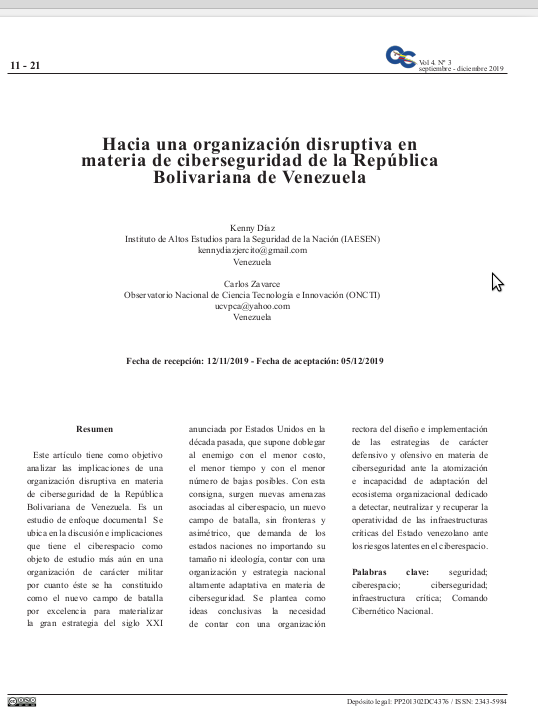Towards a disruptive cybersecurity organization in the Bolivarian Republic of Venezuela
Keywords:
security, cyberspace, cybersecurity, critical infrastructure, National Cyber CommandAbstract
This article presents the advances of a study that aims to analyze the implications of a disruptive cybersecurity organization in the Bolivarian Republic of Venezuela. It is a multi-method, descriptive field study for which it was necessary to review materials and documents regarding the object to be studied. In an increasingly globalized context, a new area called cyberspace emerges. This area has become the new battleground par excellence to materialize the great strategies of the 21st century announced by the United States in the past decade, which involve defeating the enemy at the lowest possible cost, in the shortest possible time and with the least number of potential casualties. Bearing this slogan in mind, new threats associated with cyberspace arise. It is a new borderless and asymmetrical battlefield that demands that nation-states, regardless of their size or ideology, need to have a highly adaptive national cybersecurity organization and strategy. The concluding ideas show that there is a need for a leading organization to design and implement defensive and offensive cybersecurity strategies. This need arises due to the atomization of the organizational ecosystem that is dedicated to detecting, neutralizing, and recovering the operability of the Venezuelan State's critical infrastructure when faced by latent risks in cyberspace, as well as its inability to adapt to these.
Downloads
References
Beer, S. (1985). Diagnosting The System for organizations. Gran Bretaña: John Wiley & Sons.
Foro Económico Mundial (2019). Estudio “Riesgos Globales 2019”. En Red. Disponible en: https://es.weforum.org/ [Consulta: 2019, octubre 21].
Levin, A., Goodrick, P., & Ilkina, D. (2013). Securing Cyberspace: A comparative review of strategies worldwide. The 2014 IT Canadian Conference. http://www.ryerson.ca/tedrogersschool/privacy/documents/Ryerson_cyber_crime_final_report.pdf [Consulta: 2019, junio 15].
Losada, R. y Casas, A. (2008). Enfoques para el análisis político. Historia, epistemología y perspectivas de la ciencia política. Bogotá: Pontificia Universidad Javeriana.
Narvarte, P. (2002). Bases teórico-metodológicas para el diagnóstico y diseño de organizaciones. [Transcripción en línea]. Disponible: http://www.comenius.usach.cl/.../DIAGNOSTICO%20Y%20DISEÑO%20ORGANIZACIONAL1.doc. [Consulta: 2019, marzo 21].
Plan Socialista de Desarrollo Económico y social de la Nación 2019-2025. Presidencia de la República Bolivariana de Venezuela. [Transcripción en línea]. Disponible: http://www.gobiernoenlinea.ve.noticias-view/shareFile/PDN.pdf.[Consulta: 2019, Noviembre 10, 12 y 16].
Rain O., & Peeter. L (2010) Cyberspace: definition and implications. Cooperative Cyber Defence Centre of Excellence, Tallinn, Estonia.
Sánchez, G. (2019). Ciberguerra y ciberterrorismo ¿realidad o ficción? Una nueva forma de guerra asimétrica. Instituto Universitario General Gutiérrez Mellado, 2019.
Umphress, D. (2007). El Ciberespacio. ¿Un aire y un espacio nuevo?, Air & Space Power Journal. Tercer Trimestre.

Downloads
Published
How to Cite
Issue
Section
License

This work is licensed under a Creative Commons Attribution-NoDerivatives 4.0 International License.







